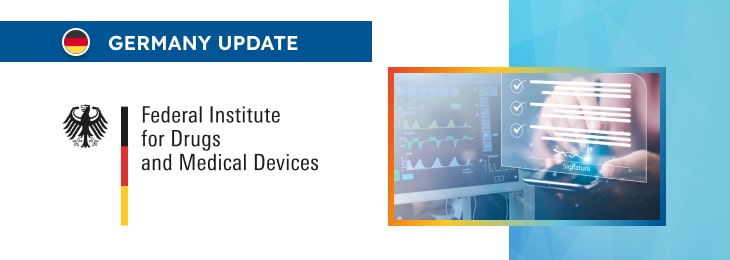The article outlines the key points related to reporting serious adverse events in the context of clinical trials.

Table of content
The German regulating authority in the sphere of healthcare products has published guidelines dedicated to reporting Serious Adverse Events occurring in the course of clinical investigations involving medical devices. The document provides an overview of the regulatory requirements to be followed by the parties responsible for clinical investigations (study sponsors) in order to ensure the safety of patients and proper communication exchange.
The guidance provides additional clarifications and recommendations to be taken into consideration in order to ensure compliance with the said requirements, and could be subject to changes, should such changes be reasonably necessary to reflect corresponding amendments to the underlying legislation.
Introduction to SAE and DD Reporting Under MDR and MPDG
Since the enforcement of the Medical Device Regulation (MDR) on May 26, 2021, all clinical trials requiring notification or approval by the Federal Institute for Drugs and Medical Devices (BfArM) must report serious adverse events (SAEs) and product defects (DDs) as per the European Regulation 2017/745 (MDR) and the German Medical Devices Implementation Act (MPDG).
This requirement applies to trials initiated under the Medical Devices Act (MPG) that are considered ongoing as of the MDR effective date. However, performance studies of in vitro diagnostics are exempt from these requirements.

Reporting Forms and Procedures Post-MDR Implementation
According to the guidance, from May 26, 2021, until the central European database EUDAMED or the German Medical Device Information System becomes available, the following guidelines must be followed:
- MDCG-SAE Compilation Table: The MDCG-SAE compilation table, outlined in the MDCG guidance “Guidance on safety reporting in clinical investigations” replaces the MEDDEV-SAE compilation table. This guidance includes crucial instructions on reporting deadlines and table completion.
- BfArM SAE Individual Reporting Form: German trial sites must continue using the BfArM SAE individual reporting form.
- Quarterly Summary SAE Evaluation: BfArM requires a quarterly summary SAE evaluation, with details available in the overview table.
- Submission: All SAE reports should be sent to the respective functional mailbox.
Reporting Deadlines
According to the respective MDCG guidance, the reporting deadlines are:
- Immediate Risk Events: Events that indicate immediate risks, severe injury, or illness requiring immediate corrective action must be reported within two calendar days of the sponsor becoming aware of the event or new related information.
- Other Reportable Events: All other reportable events described in Article 80 MDR or §64 Section 1 MPDG, including new findings or updates, must be reported within seven calendar days of the sponsor’s awareness.
For performance studies, the previous reporting deadlines under MPSV remain valid until the IVDR takes effect on May 26, 2022.
Terms and Definitions
In addition to the above, and in order to assist the parties involved with interpreting the provisions of the applicable legislation and following the requirements set forth therein, the document also provides definitions of the key terms and concepts used in the context of SAE reporting.
In particular, the authority states that with the MDR enforcement, new definitions for serious adverse events and product defects replace those under the MPSV:
- Adverse Event (Article 2 No. 57 MDR): Any unfavorable medical occurrence, unintended disease or injury, or adverse clinical symptoms, including abnormal lab findings, in trial participants, users, or others during a clinical trial, regardless of the association with the investigational product.
- Serious Adverse Event (Article 2 No. 58 MDR): An adverse event leading to serious health deterioration (e.g., life-threatening conditions, permanent damage, hospitalization), or fetal harm.
- Product Defect (Article 2 No. 59 MDR): Deficiencies in identification, quality, durability, reliability, safety, or performance of an investigational product, including malfunctions or inadequate information from the manufacturer.
Reporting Obligations Based on Clinical Trial Type
The document also outlines the key provisions of the applicable regulations addressing the aspects pertaining to the reporting requirements:
- Approval-Required Clinical Trials (Article 70(7) MDR): SAE/DD Reporting Obligations: As per Article 80 MDR and § 63 MPDG.
- PMCF Trials with Additional Procedures (Article 74 MDR): Vigilance Obligations: Follow post-market surveillance (Article 87-90 MDR); SAEs with Established Causal Links: Report SAEs linked to investigational procedures or additional procedures (Article 80(6) MDR).
- PMCF Trials Without Additional Procedures: Occurrence Reporting Obligations: No need to report SAEs/DDs to the Federal Authority.
- Other Clinical Trials (Section 3(4) MPDG): SAE/DD Reporting Obligations: As per § 64 MPDG, similar to Article 80(2) and (3) MDR; CE-Marked Products with Specific Criteria: Occurrence reporting obligations, but no need to report SAEs/DDs to the Federal Authority.
Important Notes on SAE/DD Summary Evaluations
The authority also outlines the scope of information to be included in the respective summary a party responsible for a clinical investigation should provide when reporting serious adverse events associated with the products in question:
- Content: Must include significant comparative data from literature or other sources related to serious complications linked to the investigational product or associated procedures.
- Format and Frequency: Submit concurrently with the SAE/DD report table (MDCG – Clinical Investigation Summary Safety Reporting Form) and update every three months.
- Evaluation: Demonstrate the criteria used to assess whether a positive benefit-risk ratio exists throughout the trial.
Filling Out the MDCG-SAE/DD Reporting Table
According to the guidance, the following requirements should be considered when completing the reporting table:
- Continuous Updates: Maintain a continuous record, adding new information to previously reported events as necessary, marked as “modified”.
- Date Format: Use “dd/mm/yyyy” format and avoid empty cells if data is available.
- Avoid Formal Changes: Responsible parties should avoid non-substantive changes such as spelling corrections or format adjustments, as these can cause duplication and additional evaluation fees.
For further details, the interested parties should refer to the privacy statement and additional guidance documents issued by the BfArM to address specific matters.
Conclusion
In summary, the present guidance highlights the key points related to the regulatory framework for reporting adverse events associated with medical devices undergoing clinical investigations. The document outlines the trigger events for reporting, provides additional clarifications regarding the applicable procedures, and also specifies the relevant regulations to be taken into consideration by study sponsors.
How Can RegDesk Help?
RegDesk is an AI-powered Regulatory Information Management System (RIMS) designed to simplify global compliance for medical device companies. With regulatory intelligence covering 120+ markets, RegDesk helps you prepare and publish global submissions, manage standards, conduct impact assessments, and stay ahead of regulatory changes all from a single, centralized platform. Expanding into new markets has never been easier.

